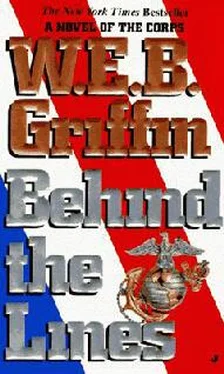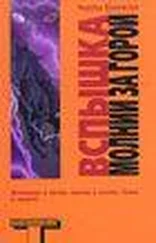W.E.B. Griffin - The Corps VII - Behind the Lines
Здесь есть возможность читать онлайн «W.E.B. Griffin - The Corps VII - Behind the Lines» весь текст электронной книги совершенно бесплатно (целиком полную версию без сокращений). В некоторых случаях можно слушать аудио, скачать через торрент в формате fb2 и присутствует краткое содержание. Жанр: prose_military, на английском языке. Описание произведения, (предисловие) а так же отзывы посетителей доступны на портале библиотеки ЛибКат.
- Название:The Corps VII - Behind the Lines
- Автор:
- Жанр:
- Год:неизвестен
- ISBN:нет данных
- Рейтинг книги:3 / 5. Голосов: 1
-
Избранное:Добавить в избранное
- Отзывы:
-
Ваша оценка:
- 60
- 1
- 2
- 3
- 4
- 5
The Corps VII - Behind the Lines: краткое содержание, описание и аннотация
Предлагаем к чтению аннотацию, описание, краткое содержание или предисловие (зависит от того, что написал сам автор книги «The Corps VII - Behind the Lines»). Если вы не нашли необходимую информацию о книге — напишите в комментариях, мы постараемся отыскать её.
The Corps VII - Behind the Lines — читать онлайн бесплатно полную книгу (весь текст) целиком
Ниже представлен текст книги, разбитый по страницам. Система сохранения места последней прочитанной страницы, позволяет с удобством читать онлайн бесплатно книгу «The Corps VII - Behind the Lines», без необходимости каждый раз заново искать на чём Вы остановились. Поставьте закладку, и сможете в любой момент перейти на страницу, на которой закончили чтение.
Интервал:
Закладка:
At first, in what he believed was the interim between the completion of his training and his assignment, he didn't mind at all. For one thing, it gave him something to do, and he rather liked guiding fellow Marines through the rocks and shoals of Country Club training.
But then he began to worry if the same sort of thing that happened to him at Quantico was happening to him at the Country Club. Good administrators were hard to find. And more and more Marines had been accepted by the OSS.
The last thing in the world he wanted was to be sort of a Marine Mother Hen. He wanted to get out on assignment and do something more concrete against the enemy than shepherd other Marines through training. He was no closer now to being what he thought of privately as a "fighting Marine" than he had been at Quantico.
This awareness was made even more painful with the arrival at the Coun-try Club of First Lieutenant Robert B. Macklin, USMC. Macklin was not only a rather handsome man, but his uniform-and his person-were adorned with the symbols of what Jim Brownlee wanted rather desperately to be, a Fighting Marine. Macklin wore the ring of the United States Naval Academy at An-napolis. Colored ribbons on the breast of his well-fitting uniform indicated that he had seen service in the Pacific, and that he had twice been wounded. His face was scarred from one wound; and his slight limp, which he tried but failed to hide, suggested that the wound that caused it had been more severe than the one on his face.
He wore the wings of a parachutist. And when asked, he revealed that he had been wounded with the USMC 2nd Parachute Battalion storming the beach at Gavutu during the invasion of Guadalcanal. Brownlee had heard that the Marine paratroopers at Gavutu were literally decimated-one out of ten Paramarines were killed or wounded.
"I really have only one question, Lieutenant," Brownlee said. "With all the service you've seen, I should have thought by now that you would be at least a captain."
"The Major will note," Macklin replied, demonstrating impeccable mili-tary courtesy, "that my service records have been misplaced."
"Yes, of course," Brownlee said. "I'm sure they'll turn up."
Lieutenant Robert B. Macklin devoutly hoped they would not. He was de-lighted when a master gunner in Officer Personnel at Eighth and "I" informed him that his records were missing but they were going to send him to the OSS anyway, and "hope they turn up."
With a little bit of luck, they wouldn't ever turn up, which meant The Corps would have to "reconstruct" a new set. With just a little more luck, the "reconstructed" records would not contain a copy of the devastating Officer's Efficiency Report he had received from Captain Edward Banning, the S-2 of the 4th Marines in Shanghai.
Lieutenant Macklin had given that efficiency report, and its potential ef-fect on his career, a good deal of thought. Now that he had time to consider it, he was no longer surprised that Captain Edward J. Banning wrote all those despicable-and untrue-things about him. Under the circumstances, Macklin now realized, it was perfectly understandable that he did.
For one thing, while Banning was a career officer, he did not graduate from the Academy. If memory served, Banning went to the Citadel. If not the Citadel, then to VMI or Norwich, one of those quasi-professional private mili-tary colleges that for some reason, most likely political, were permitted to com-mission their graduates into the Regular Service. It was common knowledge that Norwich, Citadel, and VMI graduates were jealous of those who went to Annapolis and West Point, and that whenever the opportunity presented itself, stuck knives into the unsuspecting backs of those who had that privilege.
Furthermore, at the time, Banning's own career was in jeopardy, and he had no one to blame for that but himself. While the Citadel, or wherever he actually went, wasn't the Academy, Banning must have had the opportunity to learn what would be expected of him, in his personal life, as a Marine officer. Teaching potential officers what would be expected of them was one of the major reasons the Army and the Navy sent West Point and Annapolis gradu-ates to serve on the staffs of the private military schools.
Becoming involved, as Captain Banning did, with a Stateless Person, a Russian woman, was conduct unbecoming an officer and a gentleman, in fact, if not in the law. If the war hadn't come along, it would have meant the end of Banning's career, and he must have known that.
Banning, furthermore, should have known better than to become close to an enlisted man, particularly one like Corporal "Killer" McCoy. McCoy was typical of the enlisted men in the 4th Marines, a product of the lower classes, obviously without a decent education. For those people, service in the Marines meant three square meals a day, a cot, and the opportunity to frequently forni-cate with the native women.
There are reasons for the line drawn between officers and enlisted men. Banning certainly knew about the line and the reasons for it, and he chose to ignore it. At the same time, it was perfectly clear that McCoy knew all about Banning's Russian mistress-and God only knows what other secrets Banning was hiding. That knowledge gave him a totally unacceptable advantage over an officer.
And then there was the matter of Lieutenant Ed Sessions's support of McCoy's outrageous charges. So far as that was concerned... it was, in fact, very disappointing. As a fellow graduate of the Academy, Sessions should have demonstrated at least a modicum of loyalty toward a fellow alumnus when that alumnus was under attack by an enlisted man. But Sessions not only knew that Banning was going to write his efficiency report but that Banning had gone off the deep end where Killer McCoy was concerned, and would take his enlisted buddy McCoy's word against anyone else's about what really hap-pened. So he went along.
The usual mechanism to keep personality conflicts out of efficiency re-ports was their review by a more senior officer. But that failed. Major Puller, the reviewing officer, already overworked preparing the 4th Marines' move to the Philippines, had the choice between believing Banning, whom he knew, and an officer who wasn't in their clique. It was as simple as that.
His subsequent assignment as a mess officer at Quantico was, Macklin knew, a direct result of Banning's efficiency report. That sort of duty does not fall to graduates of the Naval Academy. But he resolved then to do the best job he could.
And then-and he still found this incredible-Corporal Killer McCoy showed up at Quantico as an officer candidate. The only officer candidate in his class from the ranks. The only one who had not spent two weeks in a col-lege classroom, much less taken a degree.
In the matter of his encounter with McCoy at Quantico, Macklin was will-ing to admit that he made an error in judgment. On the one hand, obviously, he owed it to The Corps to do whatever was necessary to keep such a man from being commissioned. On the other hand, he should have approached the appro-priate officer at the school and told him what he knew of McCoy from personal knowledge-information that made the notion of commissioning him an offi-cer absurd on its face.
His personal knowledge would reveal that McCoy was not only insubordi-nate and untruthful, but the reason he was known in China as "Killer" was that he had become embroiled in a barroom, or brothel, encounter with Italian Ma-rines; he'd stabbed two of them fatally. Some sort of technicality kept him from getting what he deserved-twenty years to life in the Portsmouth Naval Prison. But clearly a man with murderous instincts who wallowed in drunken-ness and depravity was not qualified to be a Marine officer.
At the time, however, doing something official did not seem to be the best course of action. His good intentions, his concern solely for the good of The Corps, it seemed at the time, might be misunderstood.
Читать дальшеИнтервал:
Закладка:
Похожие книги на «The Corps VII - Behind the Lines»
Представляем Вашему вниманию похожие книги на «The Corps VII - Behind the Lines» списком для выбора. Мы отобрали схожую по названию и смыслу литературу в надежде предоставить читателям больше вариантов отыскать новые, интересные, ещё непрочитанные произведения.
Обсуждение, отзывы о книге «The Corps VII - Behind the Lines» и просто собственные мнения читателей. Оставьте ваши комментарии, напишите, что Вы думаете о произведении, его смысле или главных героях. Укажите что конкретно понравилось, а что нет, и почему Вы так считаете.










